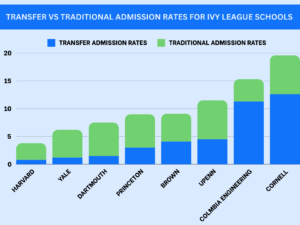Student-centric advice and objective recommendations
Higher education has never been more confusing or expensive. Our goal is to help you navigate the very big decisions related to higher ed with objective information and expert advice. Each piece of content on the site is original, based on extensive research, and reviewed by multiple editors, including a subject matter expert. This ensures that all of our content is up-to-date, useful, accurate, and thorough.
Our reviews and recommendations are based on extensive research, testing, and feedback. We may receive commission from links on our website, but that doesn’t affect our editors’ opinions. Our marketing partners don’t review, approve or endorse our editorial content. It’s accurate to the best of our knowledge when posted. You can find a complete list of our partners here.
Can You Transfer Into an Ivy League School?
 By
Cece Gilmore
By
Cece Gilmore 
Cece Gilmore is a Content Writer at Scholarships360. Cece earned her undergraduate degree in Journalism and Mass Communications from Arizona State University. While at ASU, she was the education editor as well as a published staff reporter at Downtown Devil. Cece was also the co-host of her own radio show on Blaze Radio ASU.
Full BioLearn about our editorial policies

Bill Jack has over a decade of experience in college admissions and financial aid. Since 2008, he has worked at Colby College, Wesleyan University, University of Maine at Farmington, and Bates College.
Full BioLearn about our editorial policies

Maria Geiger is Director of Content at Scholarships360. She is a former online educational technology instructor and adjunct writing instructor. In addition to education reform, Maria’s interests include viewpoint diversity, blended/flipped learning, digital communication, and integrating media/web tools into the curriculum to better facilitate student engagement. Maria earned both a B.A. and an M.A. in English Literature from Monmouth University, an M. Ed. in Education from Monmouth University, and a Virtual Online Teaching Certificate (VOLT) from the University of Pennsylvania.
Full BioLearn about our editorial policies

The Ivy League comprises the most prestigious private universities in the United States. Therefore, it is no wonder that transferring into an Ivy League is a desired step for so many students. So, are you allowed to transfer into an Ivy League school? The answer is yes! Read more to find about transferring into an Ivy League school.
What is an Ivy League school?
The Ivy League is made up of eight private universities. This select group includes Brown University, Columbia University, Cornell University, Dartmouth College, Harvard University, Princeton University, University of Pennsylvania, and Yale University. The title “Ivy League” refers to the collegiate athletic conference (founded in 1954) that the eight schools belong to.
Apply to these scholarships due soon
Are you allowed to transfer into an Ivy League school?
Whether you are attending a community college or a state university, you can apply to transfer into an Ivy League school. Transfers are usually accepted after sophomore year. However, keep in mind that depending on the school, it is more difficult to gain admission as a transfer than a first-year student. This especially applies to “The Big Three” schools known as Harvard, Yale, and Princeton.
Don’t miss: Ivy League scholarships: what students need to know
How difficult is it to transfer into an Ivy League school?
Below, we listed the eight Ivy League schools in order of transfer admits, starting from least to most. We also included the admit rate for first-year traditional applicants. Take note that we separated Columbia University as they have two truly unique transfer opportunities that are available to nontraditional adult and community college students. Columbia University is known as a “military friendly school” for veterans seeking their college degrees.
All information is linked to each individual university’s most recent Common Data set.
- Harvard University: 0.79% (compared to 3% of first year-applicants)
- Yale University: 1.2% (compared to 5% of first year-applicants)
- Dartmouth College: 1.5% (compared to 6% of first-year applicants)
- Princeton University: 3% (compared to 6% of first year-applicants)
- Brown University: 4.1% (compared to 5% of first year-applicants)
- University of Pennsylvania: 4.5% (compared to 7% of first-year applicants)
- Columbia College and Columbia Engineering: 11.3% (compared to 4% of first year applicants)
- Cornell University: 12.6% (compared to 7% of first-year applicants)
- Columbia General Studies: 56.2% (compared to 28% of first-year applicants)
Also see: Acceptance rates at Ivy League Schools
Here is a helpful chart breaking down this information!

The above percentages are meant to offer a realistic view of how challenging transferring into an Ivy League school can be. Now that we have that out of the way, let’s get into applying to one of the Ivies!
Check out: Top tips for Ivy League acceptance
Advantages of transferring into an Ivy League school
Save money by transferring in
Unless you have financial need, Ivy League tuition tends to be expensive. Attending a more affordable school for two years and then transferring into an Ivy League school can save on tuition costs. In addition, you will still graduate with a degree from an Ivy League while saving money!
Improve your academic standing
Ivy League schools are academically rigorous and require applicants to have an impressive application for admission. If grades were the reason why you were not admitted to an Ivy league, going to a non-Ivy League offers you the chance to improve your grades. With a better academic transcript, you will increase your chances of acceptance into the Ivy League school you desire.
Related: Top 10 tips to improve your GPA
What steps do you need to take in order to transfer to an Ivy League college?
Assess why you want to transfer
The first and arguably most important step to take when you want to transfer to an Ivy League is to think about why you want to transfer. Create a pros and cons list of staying at your current school vs. transferring. Once you are certain in your decision, it is time to begin the transfer process!
Related: What are public Ivy League schools?
Complete research on the Ivy League schools
Completing research on the Ivy League schools you are interested in is next. You should be thoroughly researching the following:
- Location
- Financial aid/tuition cost
- Programs offered
- Transfer requirements
Make sure that your research provides you with a good idea of what being a student at that school will be like. If possible, take a tour when school is in session. If that is not possible, virtual tours are available.
Related: Top questions to ask on a college campus visit
Meet with your academic advisor
Once you decide which Ivy League school you want to attend, schedule an advising appointment with your advisor. Your advisor will be able to walk you through the transfer process and provide you with advice and help along the way.
Determine what credits transfer
It is important to check that you have the right number of credits completed to be able to transfer into an Ivy League (usually, students transfer in as juniors). In addition, make sure that the credits you have completed so far will transfer to ensure that you do not fall behind academically.
Also see: How long are college credits good for?
Apply on time!
Make sure you take note of the deadlines for transfer students for the schools you want to attend. You want to make sure you are submitting your application on time to ensure that the transfer process goes smoothly.
Related: College application deadlines 2024-2025: what you need to know
How can you improve your chances of transferring into an Ivy League?
Improve your grades
While attending community or state college, you’ll want to make sure your transcript is in tip-top shape to help improve your transfer chances. Focus on earning the best grades possible.
Related: High school and college GPA guide
Meet the deadlines
Meeting deadlines is a crucial part of applying to college, whether as a regular applicant or a transfer student. Be sure to allow yourself plenty of time to submit a stellar application.
Write a compelling essay
Personal essays are one of the most important parts of your application. Writing an interesting personal statement will help you stand out from the rest of the applicants. Be sure to select and write about a topic that you’re passionate about and reveal pieces of your personality.
Further reading: How to write an essay about yourself
Find the best instructors to give you letters of recommendation
Ivy League schools typically require one to two letters of recommendation. The best candidates to write letters of recommendation are instructors who are familiar with you that teach a class you are excelling at. Therefore, make sure you are forming strong relationships with your current professors to ensure that you will get great letters of recommendations written about you.
Prepare for your interview
Some Ivy League schools require you to complete an interview with a current or former student of their school. If a school offers an interview, you should definitely accept the offer! Prepare for the interview by researching the college, reviewing potential questions, and being respectful and polite to the interviewer. This is the perfect opportunity to convey your sincere desire to attend the Ivy League school.
Related: Ace your college admissions interview in 60 seconds
Wrapping up
Transferring to an Ivy League school is a huge step, so make sure it is something you really want to do! Preparation is key, as your application needs to stand out because the application pool will be so much smaller. Take advantage of any and all opportunities to demonstrate your desire to attend a particular Ivy League school. This includes interviews, tours, and writing an amazing personal statement. Best of luck on your academic journey!
Also see: What is demonstrated interest in college admissions?
Frequently asked questions about transferring into an Ivy League school
How competitive is the transfer process for Ivy League schools?
What classes do I need to transfer into an Ivy League school?
What do Ivy League schools look at for transfer admission?
What GPA do I need to transfer to an Ivy League school?
Can I transfer to an Ivy League school as a non-traditional student or adult learner?













 SAT" printed on his pencil">
SAT" printed on his pencil">
